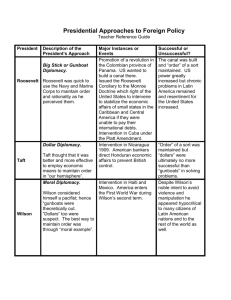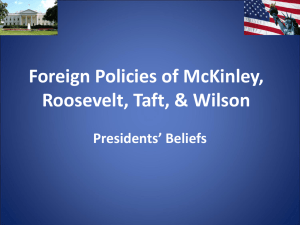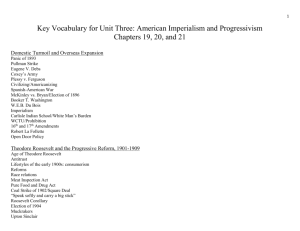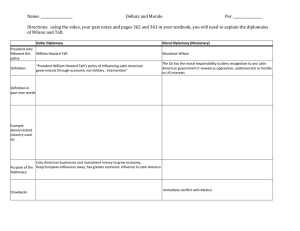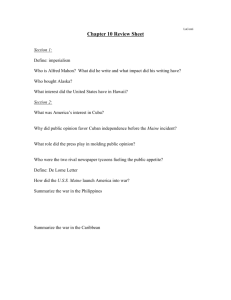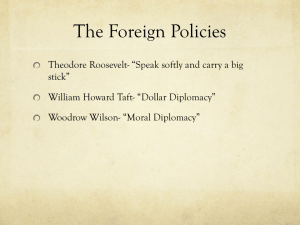PPT-Imperial Motivations
advertisement
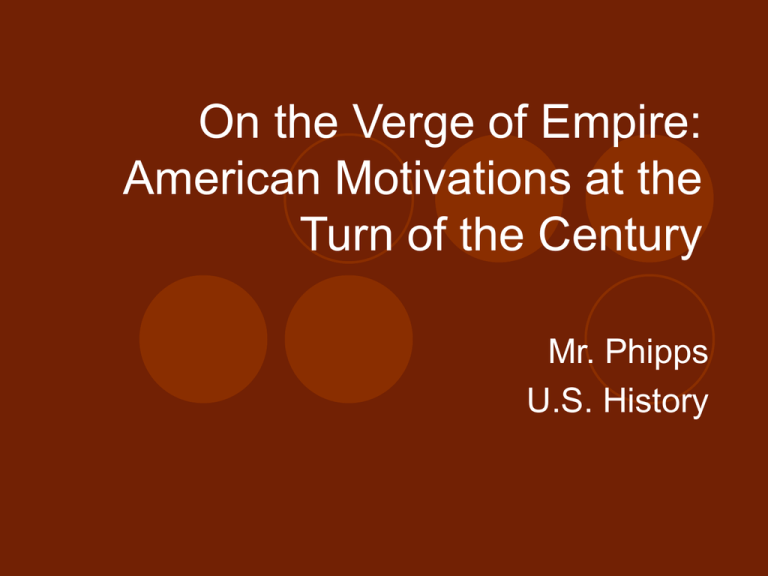
On the Verge of Empire: American Motivations at the Turn of the Century Mr. Phipps U.S. History The Imperial grab-bag, a free-for-all for all world powers. California State Standards 11.4 Students trace the rise of the United States to its role as a world power in the twentieth century. 11.4.1. List the purpose and the effects of the Open Door policy. 11.4.2. Describe the Spanish-American War and U.S. expansion in the South Pacific 11.4.4. Explain Theodore Roosevelt's Big Stick diplomacy, William Taft's Dollar Diplomacy, and Woodrow Wilson's Moral Diplomacy, drawing on relevant speeches. Arguments For Expansion: Economic Overproduction of Goods: American industrialization created more raw materials and manufactured goods than could be sold (supply exceeded demand) Mass consumption evident in chain stores, mail order, and department stores Required new markets to sell goods Labor Rise of Organized Labor: QuickTime™ and a TIFF (Uncompressed) decompressor are needed to see this picture. The International Workers of the World, the Wobblies, was considered one of the most radical labor unions at the turn of the century, known for rioting. AFL and Knights of Labor forced higher wages and better working conditions Cost of business increased Labor unrest forced businessmen to find other labor sources Other Economic Considerations Federal government increased regulation of business (anti-trust, most notably) Overseas expansion was sound economic policybegin pre-globalized companies Recent recessions: Panic of 1893 indicated the need for economic regulation Picture of the Panic of 1893 as it would have affected the New York Stock Exchange. Ideological Arguments Manifest Destiny: “Westward Ho” The angel of “progress leading Americans westward. The West, considered the Promised Land, brought millions in search of cheap land. Advocated by vocal expansionists: F.J. Turner, Theodore Roosevelt, and Henry Cabot Lodge The frontier was quickly vanishing (due, in part, to population boom, agricultural, and industrial expansion) The frontier symbolized the democratic ideal of freedom and self reliance International expansion must replace geographic barriers in North America The White Man’s Burden White Man’s Burden: Advocated by missionaries like Josiah Strong Derived from Rudyard Kipling’s poem intended to help the savages U.S. must spread democracy, Christianity, and civilization throughout the world Brought a sense of paternalism to colonialism “The Cares of a Growing Family.” Paternalism, a condescending approach taken by imperialist countries to the natives, implied that the civilized country should treat other countries like children. American Nationalism The power of the American eagle is clearly evident in its wingspan which covers the world. Note, also, that the light from the sun emanates from behind the bird. Incidentally, the national bird was originally proscribed, by Ben Franklin, to be the turkey. Advocated in national elections America was destined to be the most powerful protector of all things good: money to spend, food to eat, human rights, culture, etc America must compete with rival imperial powers: AustriaHungary, Germany, Britain, France, and Russia (all the powers involved in WWI) America has the responsibility to share the right of selfdetermination, democracy, selfgovernment and human rights Social Darwinism Derived from science, eugenic, and pseudoscienctific (racial) theory All countries, in order to survive, must compete The fittest (militarily, culturally, and economically) country and the one which can adapt, will prevail QuickTime™ and a TIFF (Uncompressed) decompressor are needed to see this picture. Eugenics, the 19th century study of racial genetics became the main justification for racial superiority. This, and phrenology, the study of the bumps on a human head, explained group and individual psychology Arguments For Expansion: Politics Congress: Advocated by highranking Senators Curry favor with lobbyists President: Roosevelt’s Big Stick Diplomacy, a new approach in American foreign policy, clearly defined the role of the U.S. in the world. It indicates, not only the new power (technological and militarily) of the U.S., but the declining power of the European nations. This corresponding decline resulted from constant warfare, competition, and the cost of maintaining overseas colonies. Captured a new mood in politics, shaped by individual Advocated by popular presidents: Theodore Roosevelt, William Howard Taft, and Woodrow Wilson A Different Approach “Big Stick Policy”Theodore Roosevelt Protect American interests abroad Be prepared to protect/balance foreign interests Use diplomacy, but exercise military strength, or threaten military A Congressman, Asst. Sec. of Navy, Lt. Col., Vice President, and President, TR was also a naturalist, conservationist, rancher, explorer, prolific author, and arbitrator. Roosevelt’s ego, zeal and charisma imbued everything he did. Taft “Dollar Diplomacy”William Howard Taft Use “dollars instead of bullets” Provide financial aid to countries in order to ensure social/global harmony Taft, considered to be the largest president in American history, is also considered to be a better trustbuster and Justice of the Supreme Court than a president. His foreign policy, of investing in foreign governments, did not keep the peace, but rather drained the American economy and forced dependence on American loans Wilson “Moral Diplomacy”Woodrow Wilson Make the world “safe for democracy” Help countries who want to become “democratic” Wilson’s unbending, unflinching, and uncompromising belief in American democracy and Christianity failed to make foreign allies. Criticized as a bigot and egoist, Wilson failed to successfully mediate the Mexican Revolution or ratify the Treaty of Versailles, ending WWI. Strategic Arguments for Expansion Based on Admiral Alfred T. Mahan’s Book, The Power of the Seas Mahan’s treatise on naval control and supremacy set off the first arms race of the twentieth century. The race to mobilize a steel navy and develop new naval technology was first accomplished by the Germans, then the British in Europe. The Germans were the first to develop the submarine Claimed a fully equipped modern navy would ensure domestic tranquility, economic control, and world peace Becoming a superpower depended on a modern navy Strategic Militarism Arms Race Control of the seas depended on rapid buildup and construction of a steel navy Control of the seas depended on the rapid deployment of the navy across oceans German superiority in submarine technology resulted in their control of the Atlantic prior to the Great War Control of foreign ports American shipbuilding was a slow process, with shipyards primarily in the East Coast. It would often take over 240 days to construct and fit a naval ship. By World War II, Henry Kaiser cut the time it took to 22 days Including the Hawaiian port of Pearl Harbor, the control of islands provided fuel, strategic protection, and a rest stop Arguments Against Expansion: Economics Vocalized by the Anti-Imperialist League, which included: Authors Mark Twain and William James Labor leader Samuel Gompers Industrialists Andrew Carnegie Criticized that an imperialist foreign policy would be very expensive Building and maintaining a well developed army and navy Protecting cargo transport ships Subduing and convincing foreign governments Suppressing revolts and re-building foreign infrastructure (nation-building) Economics Federal government didn’t have the money Would require private contracts which would further corrupt government Too much labor unrest, urban poverty, agricultural depression, and unemployment required focus on domestic spending Uncle Sam, ever the symbol of American virtue (and vice) is here seen as a nonchalant guardian of the world. His posture is unworried and his expression, unconcerned. Ideological Arguments Imperialism fundamentally opposed to American ideals of self-government, selfdetermination, and democracy “Manifest Destiny” was an excuse for greed and gaining profit “White Man’s Burden” was inherently patronizing and racist Politics The government had failed to ensure the right of democracy to African-Americans, Mexican-Americans, most immigrant groups, the poor, and all women A Comparative Look: A Summary Arguments For Expansion Cheap resources and new markets Manifest Destiny Social Darwinism Required ports Logical extension of U.S. Arguments Against Expansion Expensive Difficult to maintain Anti-Democratic Racist Patronizing In Short The imperialist agenda won out Character of agenda depended on presidency and key leadership Arguments in favor of imperialism outweighed arguments against imperialism All superpowers, throughout history, have succeeded on a balanced imperialist policy All superpowers, throughout history, have failed if their policy overextended their ability and resources
